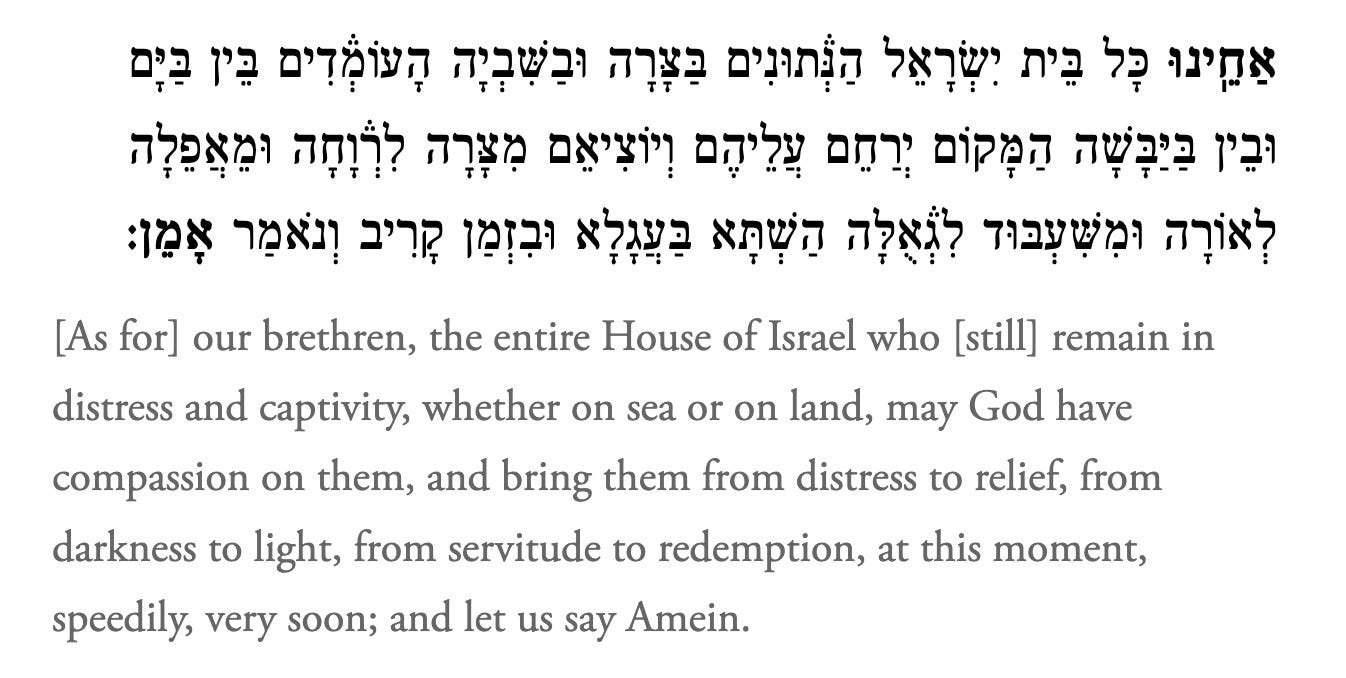From darkness to light ... while some Israelis are worried about losing power, others we might not expect are lacing up their boots
What's being called the "Darkness Scenario" if we got to all out war with Hezbollah, and a profile of a Haredi woman who explains to her children why she's joining the army
Barring anything foreseen-but -not-yet-happening in the north, this may just be a relatively quiet news week. Who knows? Hoping that it will be, we’re going to try to focus on the indomitable Israeli spirit this week. Israeli television has produced some genuinely fabulous clips of interesting stories, and we’re going to share them with you over the week, with English subtitles added.
As part of that, today’s two glimpses into the various sentiments making their way about these parts:
What’s commonly being called the “Darkness Scenario” — which we’ll explain briefly, and
Rivka Peleg, who defines herself asl ultra-Orthodox, joins the army. and explains to her children why.
This is the front page of Yediot Ahronot on Friday. Why is the Hadera power plant the main photograph? Not because anything has happened there, but because Israelis fear that it might.
Ever since the Hezbollah drone video (that we posted last week—see about halfway down the post, the video is immediately above the photo of Rabbi Farber)) went viral and Nasrallah’s warning that he might attack Cypress and that the Galilee was vulnerable to an invasion like what transpired along the Gaza border, the prospect of all out war in the north has gotten more real—at least in the minds of rank and file Israelis.
Which is why there’s all the talk of the “Darkness Scenario.” If Hezbollah could tool around Haifa with a drone for that long and return unharmed, how permeable are our skies? And will Hezbollah hit the power plants? That’s why the Hadera power plan is the front page picture. If they do, how many days will we be without electricity? Many of us have purchased generators to keep phones and laptops (and to be honest, the Nespresso machine) going for a few days, even though the army assured us that it wasn’t necessary.
Today, too, the army is assuring Israelis that the “Darkness Scenario” is very, very unlikely. Of course, Israelis’ confidence in IDF predictions is not precisely at its historic height.
The headline in the YELLOW box reads:
As the residents of the north weather yet another day without their home, it appears that a full-out war with Hezbollah is growing ever more likely. ⚫️ CNN is reporting that Washington is concerned that Israel seems to be moving materiel to the north in preparation for a military attack: “Israel’s missile and air defense systems will not be able to block Nasrallah’s missiles and drones. ⚫️ The head of the company responsible for the electric power economy warned: “After 72 hours without electricity, it will not be possible to live in Israel.” ⚫️ At the power company, they struck back: “He’s detached from reality and is creating panic.”
About the growing panic, they are certainly correct.
That deep worry is part of the story of Israel these days, but so, too, is the spirit you’ll see in the video below.
We’ll return to the headline in the green box later in the week.
This week we will be taking a look at the more inspiring elements of Israeli society in what is a dark and challenging time.
MONDAY (06/24): To say there have been many highs and lows in the last eight months would be an understatement. On Monday we’ll look at the horrors of October 7 through an excellent website that Kan 11 has created called “October 7 — 360 degrees” , and then shift to glorious day of the recent hostage rescue with an interview of two helicopter pilots who took part in the operation.
TUESDAY (06/25): In Israel these days, there are songs so vivid and descriptive that they could be read as articles in any Israeli newspaper. And there are articles that read like song lyrics. On Tuesday, we’ll explore glimpses into Israeli society through a song which has become an anthem of sorts over the last eight months, and through the words of a leading public intellectual. We’ll also share a clip of how a few thousand Israelis at a concert in Athens reacted to a performance of a song.
WEDNESDAY (06/26): In last week’s podcast we heard from Seth Farber who explained the drama over the elections for Chief Rabbi, why those elections have been delayed and what is at stake. In this week’s podcast, we’ll learn about one of Israel’s most iconic and revered personalties, and the first Ashkenazi Chief Rabbi before Israel was established, Rabbi Avraham Isaac Kook.
THURSDAY (06/27): We’ll close out the week with a video about a woman named Yael Mazarib. As you’ll hear in the video, she is first and foremost, Yael, and a commander in the IDF. What makes her story so fascinating is that she is also a part-Bedouin woman raised in Zarzir. While her ancestry may be “mixed,” there’s nothing ambiguous about her love for this country or her devotion to it.
Ever since the war began, Kan 11 has been doing some extraordinary reporting. On their website, you can find a host of terrific videos, but they are almost all in Hebrew. So we’re going to share some of them with subtitles, so a wider audience can appreciate them. The original of today’s video can be viewed here on the Kan 11 site.
Meet Rivka Peleg. Rivka is a Haredi mom of two, who works in hi-tech and lives in Jerusalem. In this video, this ultra-Orthodox woman is filmed explaining to her young children why she’s decided to join the army at an age far older than almost all recruits.
She may not be the “norm,” but it’s clear that something is happening even in the Haredi community.









Chabad does not equal Haredi in the proverbial sense.
Truth told, I have not gone beyond the opening title of this article, but feel in need of saying this, the Haredi should ALL have to serve in some capacity, either actively in this military or in some critical social service for their country (they can devote themselves to study on their off hours).